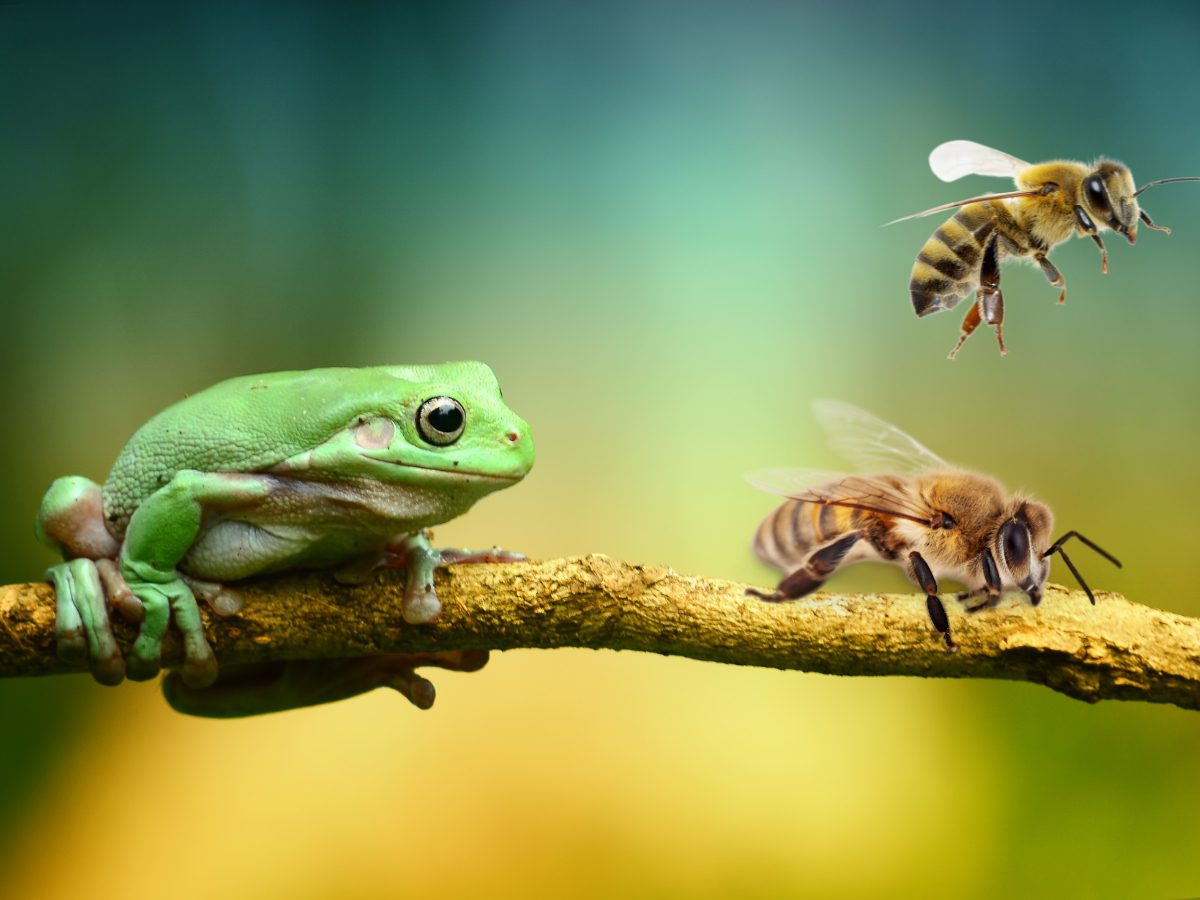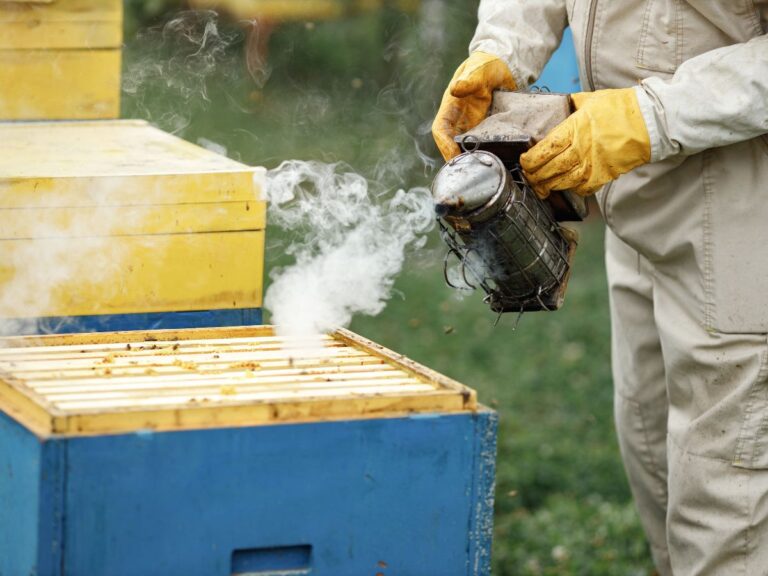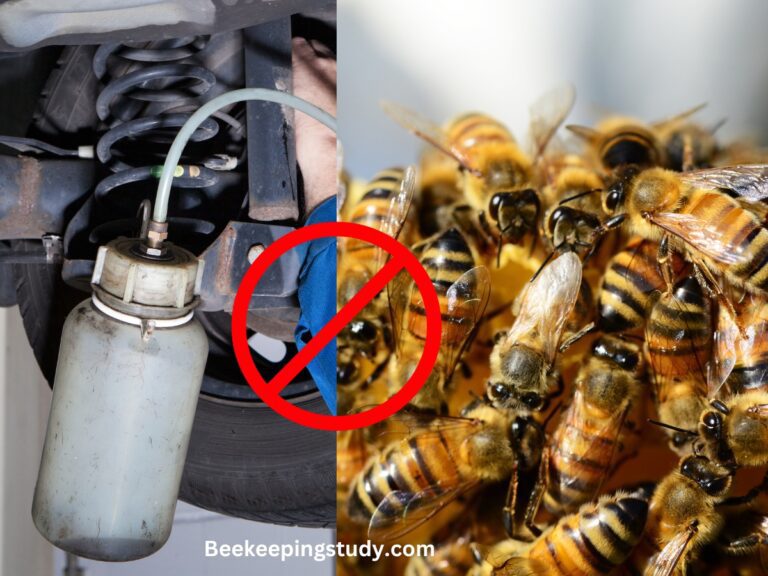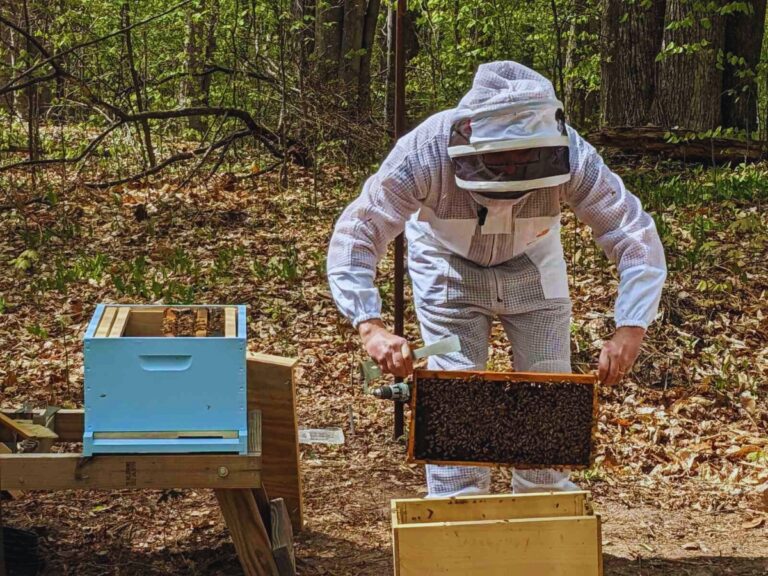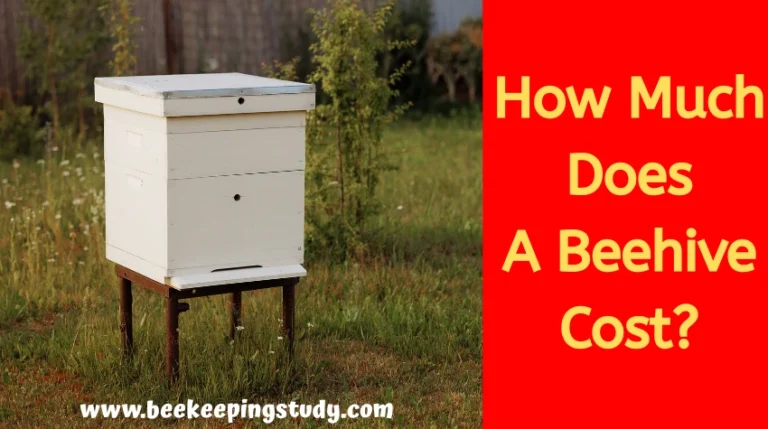This post might be created with help from AI tools and carefully reviewed by a human (Anthor Kumar Das). For more on how we use AI on this site, check out our Editorial Policy.
Surprising Fact: Do Frogs Eat Bees?
You are reading this article because you have the same curiosity as I had before. Do Frogs eat bees? That’s what I am going to reveal in this post.
Frogs are known as one the most active carnivores among amphibians. Who eat almost all types of tiny living creatures. When you are a beekeeper you must be serious and protective of your bees and bee colonies.
When you are thinking about how many animals are around that can harm your bees. You might also think can frogs really eat bees?
Throughout this post, you will find helpful information about frog’s digestive nature. Also, I will guide you on how you can protect your colonies from frogs.
Introduction About Frogs
A frog is a tiny-sized member of the amphibian species whose scientific name is Anura. Frogs have both terrestrial and aquatic species. Their body colors are different for different species.
Yellow, Green, Black, Brown, yellow, red, and so many more body-colored frogs of more than 5000 species are living all over the world.
A frog is a small-sized usually 3 to 13 inches. The Goliath species is the largest species of frog found all over the world. It has a length of 13 inches or more they can be grown up.
However, frogs have 4 legs ( you can also say 4 hands), wider brown eyes, a long tongue, and slippy skin. They don’t have any tails. They can through their long tongue to catch food that is within their range.
Frogs can live on both water and ground places like under a tree. Usually, they choose bushes for their living. If you want to know more details about frogs check this.
Frogs Diet Preferences
Frogs usually have weak maxillary teeth on the upper jaw that are usually used to cut foods before swallowing them.
Some species of frogs even don’t have any teeth. So, they can only use their large sticky tongue to swallow food. After swallowing the food reaches the stomach through the esophagus.
In the stomach, digestive enzymes are mixed with the food and pass through the duodenum and ileum for further digestion.
At the intestine, extra water is released. Also, the waste of food is removed through the cloaca.
Type Of Foods Frogs Eat
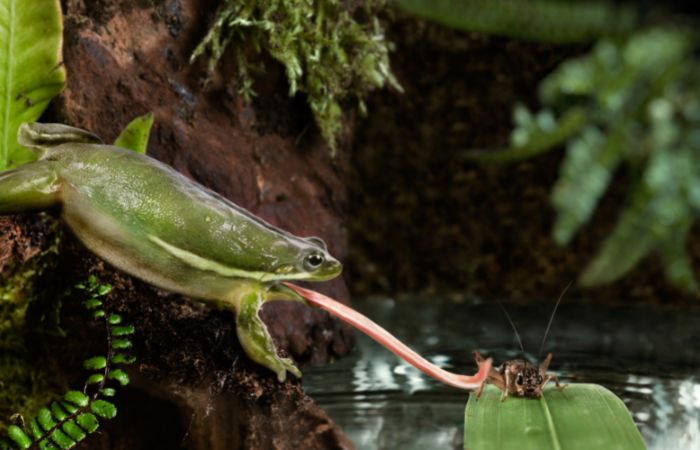
For selecting their diet frogs are very careful. Usually, they do not eat too much.
- There are some species of frogs mainly who are large in size. They are capable of eating large living creatures. For example, African bullfrogs can eat a rat in one day. Then they don’t required to eat anything for the next 1 to 3 weeks.
- There are also some frogs that eat food more than once. These frogs require more calories daily.
- Frogs usually eat small insects like grasshoppers, spiders, caterpillars, crickets, mealworms, bees, etc.
- Another interesting fact about frogs is they can eat any type of creature that will fit in their mouth.
- Some of the large frogs can even eat small frogs.
- Large Frogs can eat any large-sized rats or similar types of foods easily. While choosing rats they usually target baby rats as their primary food. But they can also eat medium to large size rats too.
If you want to keep frogs as pets, make sure to understand what your frog species is. Also, learn about their eating habit very well.
Provide them with the required amount of food and make a small shape pond for your frog. Because frogs can’t drink water directly. They use their skin to adjust the water needs of their body.
Do Frogs Really Eat Bees?
Yes, frogs eat bees if they have a chance to get bees within their hunting range. In most cases, frogs stay away from eating honey bees. They eat bees that don’t have any sting.
Usually, frogs eat bee larvae and honey and avoid attacking adult bees.
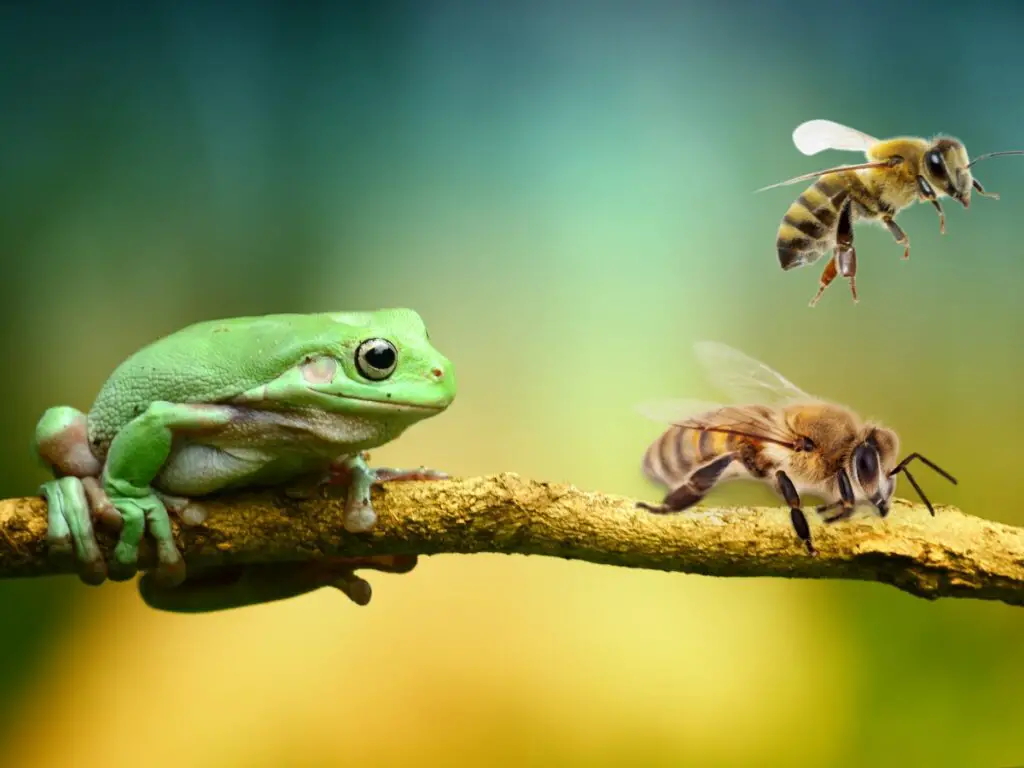
Also, frogs try not to attack a bee swarm if they are large in number. But if it found a dead bee or a single bee flying around it. Then the frog will catch and eat the bee.
How Do Frogs Eat Bees?
Frogs have a highly developed nervous system like other Mammalian species. They catch and eat bees and other insects as below.
- They can stand still in any place for a long time. Also, their eyes have a strong ability to notice any movable small species.
- Their strong sense of smell helps them to smell the presence of their food from a longer distance.
- When they specify any food at first they stay still and observe the movement of that food.
- When the food comes within its range it can jump and use its tongue to swallow it. Their tongue is sticky and large. So, they can easily catch any moving food around them with their tongue.
- Then using their sticky tong they make the creature numb and pour it into their mouth. Then they swallow it as fast as possible.
Exactly in this way frogs using their large tongues catch and swallow bees.
What Are The Frog Species That Eat Bees?
Not all frogs eat bees. Terrestrial frogs are more furious than aquatic frogs to prey on bees.
Bees are full of protein, vitamins, minerals, and other nutrients that provide a large amount of energy.
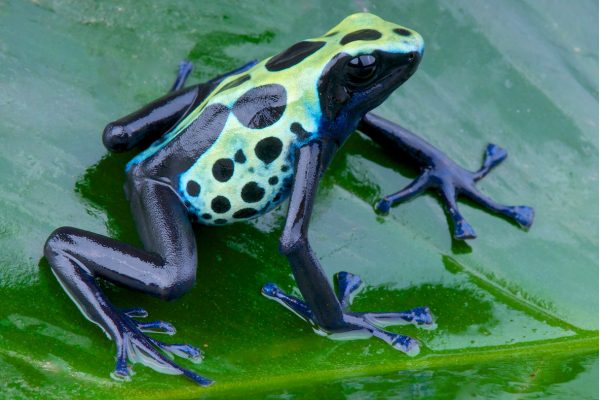
Frogs are not always intended to eat bees and they won’t directly try to attack the beehive.
They will only catch bees to meet their hunger if they are very hungry. Also, the bees are easily catchable by their tongue. Otherwise, they usually try to avoid bees as their meal.
Do Frogs Get Stung While Eat Bees?
Yes, bees can be toxic to frogs as they can sting frogs. While a frog is swallowing bees it can get stung by the bees.
Usually, while choosing bees as their food, frogs try to catch them and swallow them as fast as possible. Frogs swallow this type of food 10 to 15 times faster than it takes to catch the food and pour it into its mouth.
So their fast swallowing technique normally prevents getting stung by bees. Still, there is a chance of suddenly getting stung.
Even a dead bee’s sting remains on the stomach of the frog can be poisonous to his body. While the bee is through the esophagus, it can get hurt by the bee sting.
What Happens When Frogs Eat Stingless Bees?
But not all of the bees have stings. There are plenty of species of bees without stings that won’t hurt frogs.
So, frogs can easily eat them and won’t get stung by them. So, stingless bees will be non-poisonous to frogs. To know the different types of bees you can read this.
Carpenter bees, wood bees, and other ground bees do not have stings. So, while frogs eat ground bees they do not get stung by these bees.
Alternative Of Bees That Frogs Eat
If you are keeping a frog as a pet then select the right food for your frogs. Bees with sting can be harmful to your frogs.
So, try to avoid bees having stings to feed your frogs. You can select the following foods for your frogs instead of bees.
- Spider
- Grasshopper
- Crickets.
- Flies.
- Beetles.
- Moths.
- Bee pollen.
If you wish you can purchase honey from the market to feed your frogs. You can also purchase bee pollen for your frogs. Because bee pollen doesn’t expire for a long time.
Do Frogs Eat Honey Or Bee Brood?
Besides eating adult bees frogs can eat honey from beehives and brood bees too. Frogs even prefer choosing honey and larvae instead of adult bees for their meal.
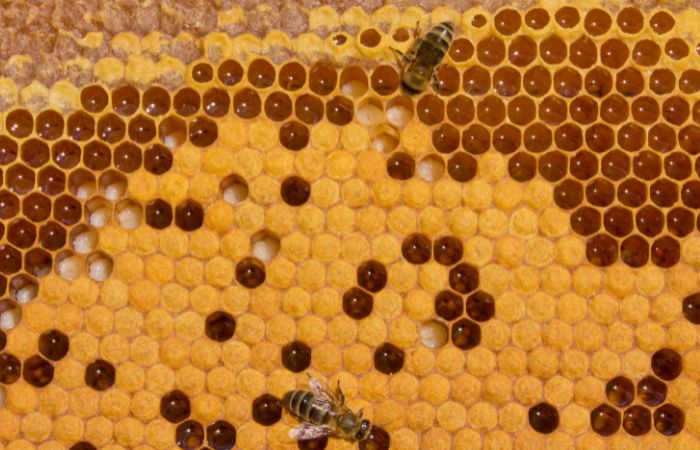
Only a small group of frogs eat adult bees. But there is a large group of frogs who can eat honey, and brood bees at their larvae and pupae stages.
Because a small frog has a higher risk of getting stung by an adult bee while swallowing it. That’s why most frogs try to avoid eating adult bees.
Honey and Bee broods are ideal food for frogs. Especially honey is made from pollen nectar that is collected from flowers by adult bees.
Honey contains sucrose and fructose and many other nutritious elements. These provide a huge amount of calories. Compared to adult bees larvae bees are more nutritious and risk-free for frogs.
Frogs even select brood bees in the larvae and pupa stage instead of adult bees. Because larvae and pupae can not fly away. Moreover, there is no risk of getting stung as the bee brood doesn’t have any sting.
What Happened When Frogs Eat Bees?
Okay, now you know that frog does eat bees. Now a question may be raised in your mind What actually happens when frogs eat bees?
As already discussed a frog can be stung by a bee while it is swallowing or even swallowed the bee. A dead bee can also sting a frog’s skin. So, usually, frogs try to avoid large bees.
Instead, they try to target honey or bee brood as their source of food. They jump to the hive and try to catch bee larvae and pupae with the help of their large tongue.
While eating an adult honey bee. If the frog gets stung then it will never go for eating bees.
Because like other mammalian animals frogs are also very careful about making mistakes. They are intelligent enough and remember from which food they got hurt. So, they will never look for opportunities to eat that food.
So, if a frog is stung by bees after eating, it will never try to eat any other bees in its whole life.
Bee larvae and pupae are risk-free for frogs. Also, bee broods are more nutritious for frogs. So, they always try to eat larvae and pupae bees instead of adult bees.
The interesting fact is that if a frog is living in a region where only stingless bees are available. Also, if the frog hasn’t been stung by the bee, it can become seriously addictive to eat bees. This is because bees are more nutritious. It provides a large amount of energy compared to other food sources for frogs.
How To Protect Bees From Eaten By Frogs?
Frogs can prey on bees if they are within the range. Also, they can attack your beehive to take away larvae, and honey. So you must be very careful about the fact.
As a beekeeper, you must give proper attention to protect your beehive from getting attacked by any animals.
So, why not make your beehive protected from frogs? Not only frogs can eat bees, but they can be a danger to the security of your colony too.
To protect your bees and beehive from frogs I have some suggestions for you.
- Keep Beehive Far From Ground: First of all, place your beehive a minimum distance of 1 meter from the ground. So, it can’t be reachable by animals like frogs, cats, and dogs.
- Cover Around Your Beehive Using Nets: You can use nets and cover around your beehive. But make a loop using a net below the beehive so that bees can fly to the flowers. You can use any other things to create a barrier around your beehive.
- Use Vinegar: You can also spray vinegar around your beehive obviously in the ground. This will keep frogs and some other animals far away from your beehive.
- Remove Bushes Around Beehive: Frogs usually live in bushes area and wet areas. So, remove all bushes and wet areas around your beehive.
- Raise Mamals That Eat Frogs But Not Bees: Last but not least! You can raise other mammals that eat frogs but are not interested in bees near your beehive. These types of mammals can be birds, Opossums, Shrews, etc.
There are also, some other ways of protecting your bees and beehive from frogs. But you can try any of the above-mentioned ways to keep frogs away from your beehive.
If any of these methods are still not solving your issue. Then try to contact the nearest animal health care specialist in your region to solve your problem.
Frequently Asked Questions
What Other Predators Eat Bees?
Besides frogs, there are a lot of other predators that can eat bees. Some of them are raccoons, skunks, giant lizards, beer, spiders, woodpeckers, and so on. Woodpeckers mainly love to eat carpenter bees.
What does honey do for frogs?
Eating honey provides strength to frogs. Honey contains a lot of nutrients that quickly provide energy. You can feed honey to your weak frogs.
Do frogs eat wasps?
Yes, frogs eat wasps too. Frogs are omnivorous. So, they can eat anything they want. Wasps are also on their diet list if it is within their range.
Conclusion About The Fact Do Frogs Eat Bees?
Hopefully, now you know that frogs can eat bees. Also, you already know that frogs target honey and bee broods of larvae and pupae stages instead of adult bees.
If you are a beekeeper you must protect the future generation of your colony. That is bee brood and honey from any type of animal that can attack your beehive. Frogs are one of them.
If your beehive contains stingless bees then it will be riskier for you.
Besides frogs, so many other predators can harm your bees too. These may include.
- Woodpeckers.
- Bears.
- Raccoons.
- Lizards.
- Honey badgers.
- Anteaters.
- Skunks, etc.
Pay more attention to ensure the proper security of your beehive. Because to build healthy colonies, ensuring safety for bees is one of the major priorities.

